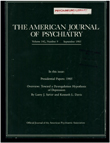The prevalence of attention deficit disorder, residual type, or minimal brain dysfunction, in a population of male alcoholic patients
Abstract
The authors assessed the prevalence of attention deficit disorder, residual type, in a population of young adult male alcoholic patients in two residential alcohol treatment programs. They found the prevalence of the disorder in this sample to be 33% and hypothesize that attention deficit disorder in childhood (and adulthood) may be associated with an increased risk for the development of alcoholism. If substantiated, this finding could be of theoretical and therapeutic importance.
Access content
To read the fulltext, please use one of the options below to sign in or purchase access.- Personal login
- Institutional Login
- Sign in via OpenAthens
- Register for access
-
Please login/register if you wish to pair your device and check access availability.
Not a subscriber?
PsychiatryOnline subscription options offer access to the DSM-5 library, books, journals, CME, and patient resources. This all-in-one virtual library provides psychiatrists and mental health professionals with key resources for diagnosis, treatment, research, and professional development.
Need more help? PsychiatryOnline Customer Service may be reached by emailing [email protected] or by calling 800-368-5777 (in the U.S.) or 703-907-7322 (outside the U.S.).



